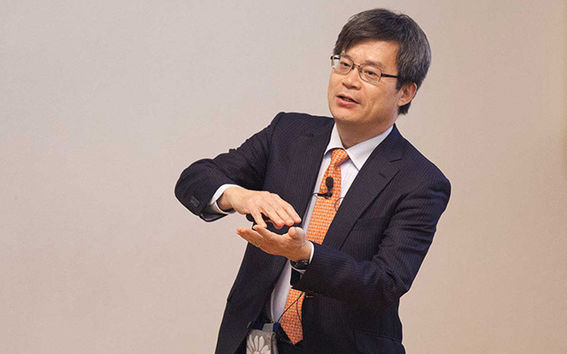Nobel laureate wants to give students space to discover

Winning a Nobel Prize last autumn wreaked havoc on Hiroshi Amano's calendar at one fell swoop. Hundreds of lecture invitations and requests for interviews, thousands of kilometres in the air, and dozens of festive events - is there any time left for research?
'I have solved the challenge by giving the students in my research group freedom', answered a cheerful Amano to a lecture hall packed full of Aalto University students, personnel, and visitors who had gathered to hear the story on the origin of LEDs, which have revolutionised illumination.
'I made my own breakthroughs very independently, without the supervision of a professor. I had the idea that I could change the world with the help of blue LEDs but I had no idea what kind of a challenge I faced', he said.
Amano's role was especially significant in the 1980s in the development of production methods of gallium nitride, a semiconductor used in blue LEDs. Now LEDs are becoming ubiquitous, and it is no wonder. LEDs are far superior to incandescent lights and fluorescent tubes both in duration and energy efficiency.
Are there any dreams left for the researcher who has won the world's most prestigious science prize?
'There are great challenges in the world that are linked with the environment, food, and energy. We still have much that needs to be done with the last one; the efficiency of illumination still needs to be improved. I hope that young people are so ambitious that they will come up with sources of light that are even better than LEDs.'
Aalto University professor Filip Tuomisto, who is collaborating with Amano, was please that the recent Nobel Prize winner came to lecture - appropriately in the International Year of Light. To the right of Amano is Tuija Pulkkinen, Vice President of Research and Innovation at Aalto University.
Photos Mikko Raskinen
Read more news

Nature of Process: Exhibition by the students of the ‘Personal Exploration’ Course
Nature of Process is a multi-material exhibition of 14 Master´s students of Aalto ARTS
Doc+ connects research impact with career direction
Doc+ panels have brought together wide audiences in February to discuss doctoral careers and their diversity.
Apply Now: Unite! Visiting Professorships at TU Graz
TU Graz, Austria, invites experienced postdoctoral researchers to apply for two fully funded visiting professorships. The deadline for expressions of interest is 20 February 2026, and the positions will begin on 1 October 2026.






